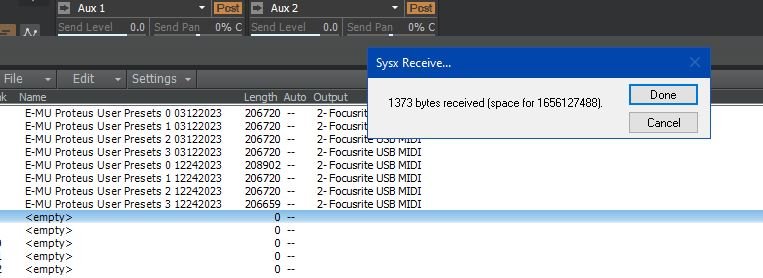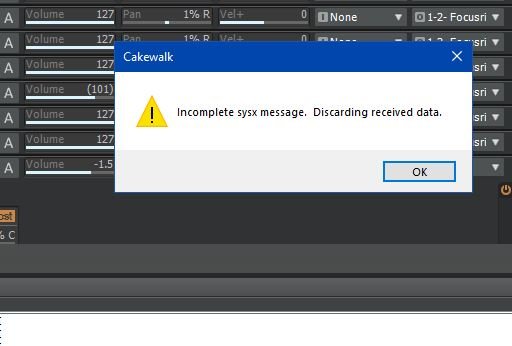alan933 Posted December 24, 2023 Posted December 24, 2023 This works fine for my synth sound banks which are quite large and each takes several minutes to complete. but I have a problem with a multi-setup receive that I have done before, its the same size as the one I did before but I get this message now for it. Any ideas on what is causing this? First this Then this
0 alan933 Posted December 24, 2023 Author Posted December 24, 2023 Ok here is a new piece of puzzle, possible work around? If I close cakewalk without saving my most recent sysex receives and then re-open and then do it again. It works. Not sure why.
0 user905133 Posted December 24, 2023 Posted December 24, 2023 (edited) I'd have to check but 206,720 bytes looks right for a complete bank dump. 1373 looks close for master settings or multis. I'd have to look it up. What I used to do when I was doing P2K and Command Station dumps that were problematic was to put a delay in the packets coming from the E-Mus. I don't have any turned on, but it should be one of the midi settings. I think it's called Sysex Delay on both P2Ks and CSes. From what you wrote, it sounds like you already have a delay set, though. There could be other causes/solutions, but tweaking delay on the E-Mu usually worked for me. Not sure why you got 206,699 for one of the banks if all the others are right. I can easily hook an E-Mu module up to double check. Edited December 24, 2023 by User 905133 added "for me" just for the sake of it. Others might do things differently. I don't care. I'm just saying what has traditionally worked for me.
0 user905133 Posted December 24, 2023 Posted December 24, 2023 (edited) 19 minutes ago, User 905133 said: I'd have to check but 206,720 bytes looks right for a complete bank dump. 1373 looks close for master settings. I'd have to look it up. What I used to do when I was doing P2K and Command Station dumps that were problematic was to put a delay in the packets coming from the E-Mus. I don't have any turned on, but it should be one of the midi settings. I think it's called Sysex Delay on both P2Ks and CSes. There could be other causes/solutions, but putting in the delay usually worked. If you can't find it or you find it but that doesn't solve it I can easily hook an E-Mu module up. PS: Someone might tell you you can tweak some settings in CbB. For some circumstances that can help, but I never had to do those tweaks with E-Mus. Also, I am assuming to don't have any other midi stuff going on when you are doing the dumps. UPDATE: I just checked one of my CWP E-Mu Bank Files. All my multis are 1373 bytes, too. Edited December 24, 2023 by User 905133
0 alan933 Posted December 24, 2023 Author Posted December 24, 2023 (edited) Thanks for the replies. I got that one to work using the method I mentioned, maybe something corrupted on last bank receive? I always save the .sys to file if I don't save the .cwp Anyways, now I have a different problem going the other way. When I try to send sysex back to E-mu I get "Error ! Code = 000 Sysex: too fast" My delay on the e-mu is 1000 ms but I assume that is for the send to cakewalk. What would determine cakewalk send speed? Is there a way to slow that? Oh , I will add, I did receive a single bank patch to sysex then changed a single param in the patch and sent it back to e-mu and it restored it. That worked, but not an entire bank. Get message above. ?? Crazy problems dealing with 20 y.o. equipment. Edited December 24, 2023 by alan933
0 user905133 Posted December 24, 2023 Posted December 24, 2023 So, I fired up my P2500 which uses the same bulk data format as the Command Stations. Even with a packet delay of 0020 milliseconds (2x as much as usual) I had dropped data in the full bank dumps. It seems like every other dump had a problem. Then I tried a multi (current multi). 1373 bytes as expected, but I got the same message you did--incomplete sysex message, 3 times in a row!!!! Never had that before. Not sure why. Maybe we do need to use one of the Cakewalk/SONAR configuration tweaks for some reason. Most of my recent dumps are from 2010-2012, though I seem to recall I did some updates probably between 2 and 3 years ago (before I started seriously exploring the use of soft synths). Since then there have been updates to Windows 10 as well as CbB. I know when CbB came out I was still using the P2500 extensively. I was using a different Win 10 PC then. Between all the updates, the "newer" PC, the age of the E-Mus, and who knows what else, it might be very difficult to find out where there is this issue "all of a sudden." There are third-party tools for E-Mu, as well as the general purpose MIDI-OX which might serve as workarounds--do the dumps, save the files, and then load them into CbB's Sysex system. Bummer! Those E-Mus were workhorses. ?
0 user905133 Posted December 24, 2023 Posted December 24, 2023 11 minutes ago, alan933 said: When I try to send sysex back to E-mu I get "Error ! Code = 000 Sysex: too fast" My delay on the e-mu is 1000 ms but I assume that is for the send to cakewalk. I'd have to check, but that sounds right. One of the CbB configuration tweaks would probably be geared towards that, I seem to remember 2 of them--possibly speed and inter packet delay. I rarely used them. Perhaps they are more important on newer PCs and newer interfaces. 1000 ms would be overkill on my PC send to Cakewalk. Today I tried 0010, 0020, and 0000, but I only did about 10-12 dumps. I was surprised, but it was also around 50% successful at 0000. I don't have the patience to do more than 0020. ? Maybe I will try 300 and make another cup of tea!!! ?
0 user905133 Posted December 24, 2023 Posted December 24, 2023 (edited) 4 minutes ago, User 905133 said: . . . CbB configuration tweaks . . . . I seem to remember 2 of them--possibly speed and inter packet delay. I rarely used them. Perhaps they are more important on newer PCs and newer interfaces. See http://legacy.cakewalk.com/Documentation?product=Cakewalk&language=3&help=SYSX.13.html . PS: I did a deep dive into the E-Mu data formats, handshaking protocols, and sysex commands so long ago I don't remember all the finer details. I will double check, but IIRC the max packet size is 256 bytes. I probably still have the spreadsheets comparing the 1607-byte preset format (P2K) and 1615-byte format (CS/P2500). Egads!!! This brings back memories of when I used to be young and had the mental energy to figure all that out and the stamina to write some tools personal tools. ? Edited December 24, 2023 by User 905133
0 alan933 Posted December 24, 2023 Author Posted December 24, 2023 Ok I believe I solved it. I found another obscure post about sysex too fast and they used Bome SendSX. It's a tiny windows 3.1 looking program that handles devices and sends/receieves. I used the default speed of 980 b/s and I saw the midi lights on the e-mu blinking fast but no error at end. It took some time and the first bank I tried 3 did not seem to restore original sound after I made a change but when I did it with bank 2 it did restore it. I'm going to try a receive with this app and see if it works better. Not trusting Cakewalk to back my hard earned data from now on. Thanks for the help and interest , and wow, someone else has a jurrasic e-mu p2500 fascinating! Merry Christmas!
0 user905133 Posted December 24, 2023 Posted December 24, 2023 Did some quick tests with MIDI-OX. With full bank dumps: some loss of data at 0000; upped to 0030; some successes and loss of data. With Current Multi: 1 data underrun followed by three 1373 captures. No tests sending anything back. Maybe another day. If I weren't so old, I'd try coding an Arduino to do sysex captures at various serial port speeds. With the Hairless MIDI<-->Serial Bridge. Might be cool to encode some dump request macros and see if the transfer can happen at 115200 bps. Proteus Pal. FYI, I've played with Royce Craven's Patch Librarian with the intent of assembling my own banks, but haven't used it in years--ever since I started diving into trying to do music with soft synths. I might try that Librarian one of these days to see if that also has issues with dumps.
0 user905133 Posted December 24, 2023 Posted December 24, 2023 Yeah I have seen others mention Bome's. It's like MIDI-OX as understand. I'd be interested in your results--especially if successful! 4 minutes ago, alan933 said: Thanks for the help and interest , and wow, someone else has a jurrasic e-mu p2500 fascinating! Merry Christmas! Ho Ho Ho!!!!
0 alan933 Posted December 25, 2023 Author Posted December 25, 2023 This worked great with Bome, was able to send and receive and it verified accurately. (while I was wrapping presents). Cakewalk sysex option is dead to me ha
0 user905133 Posted December 26, 2023 Posted December 26, 2023 (edited) Good news! I mean that Bome meets your needs, not that Cakewalk sysex is dead to you. ? Someday I might use my P2500 again as a sound module. Over the past few years I have been testing the use of the 4 x 4 knob array as a generic midi controller as part of a new live performance workflow for some specific soft synths. Sometimes as a quick and easy to use drummer. Before taking apart miles of MIDI cables, I had all my BPM modules using the P2500 as a Master MIDI Clock source. Having the clock on Port B served as a handy mnemonic: B is for Beats. ? Great to hear from someone who is also still using theirs! Edited December 26, 2023 by User 905133
Question
alan933
This works fine for my synth sound banks which are quite large and each takes several minutes to complete.
but I have a problem with a multi-setup receive that I have done before, its the same size as the one I did before but I get this message now for it.
Any ideas on what is causing this?
First this

Then this

12 answers to this question
Recommended Posts
Please sign in to comment
You will be able to leave a comment after signing in
Sign In Now